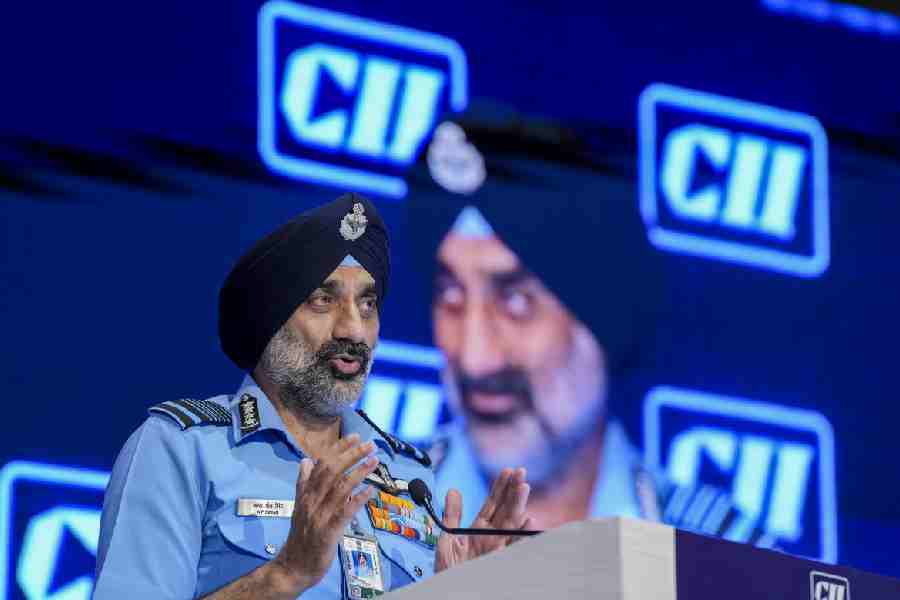Air Chief Marshal Amar Preet Singh on Thursday mouthed a dialogue from Salman Khan’s movie, Wanted, to emphasise India’s resolve to become fully self-reliant.
“Ek baar jo humne commit kar li, phir main apne aap ki bhi nahi sunta (Once I commit to something, then I don’t even listen to myself after that),” Singh said, calling for deeper trust between the armed forces and the domestic defence industry so that the aim of using more India-made machinery can be achieved.
“We are doing our best to maximise the use of Make-in-India products,” he said.
However, the IAF chief flagged serious concerns over continuous delays in India’s major defence procurement projects, including the indigenous Tejas Mk1A fighter jet, highlighting a systemic failure to meet deadlines and their impact on operational readiness.
His remarks assume significance as the Centre is pushing its Make-in-India policy in the defence sector. The IAF is facing a severe shortage of fighter aircraft and struggling to maintain its operational edge amid a delay in the delivery of the indigenous Tejas light combat aircraft being made by Hindustan Aeronautics Limited (HAL).
Against an authorised strength of 42 fighter squadrons, the IAF has 31. A fighter squadron consists of 18 aircraft.
Speaking at the CII Annual Business Summit 2025 in Delhi, where defence minister Rajnath Singh was also present, Air Chief Marshal Singh said: “Many times, we know while signing contracts that those systems will never come…. Timelines are a big issue. So, once a timeline is given, not a single project that I can think of has been completed on time.”
“Why should we promise something that cannot be achieved? While signing the contract itself, sometimes we are sure that it is not going to come up, but we just sign the contract.”
Singh stressed that in the next 10 years the air force would require more inputs from the defence industry, “but we also need to act today and get into quick Make-in-India programmes so that we can achieve the now-ready part of it”.
He also highlighted the changing nature and landscape of warfare with the advent of drone technology and the need for the timely induction of new technologies into the armed forces.
The IAF chief flagged delays in the delivery of the first batch of Tejas fighter jets, ordered by the IAF amid increased militarisation by China and Pakistan on the borders, which is seen as a major security concern for India.
The light combat aircraft (LCA) programme — the ₹48,000-crore contract for 83 Tejas jets — was signed in February 2021 with HAL, but not a single aircraft had been delivered so far.
The Tejas is a multirole light fighter aircraft and is being inducted into the IAF to replace the ageing MiG-21 fighter jet, dubbed as the “flying coffin” because of its high crash rate.
In February, too, the IAF chief had expressed his frustration over delays in the delivery of the first batch of Tejas fighter jets.
In July last year, Singh, then an Air Marshal, had said “atmanirbharta (self-reliance) cannot be at the cost of the nation’s defence”.
He had underscored the fact that he fully supported the drive towards self reliance in defence, but highlighted the deficiencies in domestic defence manufacturing and said “Atma Nirbhar Bharat should not just be a buzzword”.
Around 65 to 70 per cent of the IAF’s fighter aircraft are Russian, and most of them either need urgent upgrades or are on the verge of retirement. Having foreign aircraft also means staying dependent on other countries for parts and components.
Sources said the IAF chief’s concerns over the delay in Tejas procurement come amid China’s recent display of its sixth-generation stealth fighter jet combat aircraft, which took the world and defence experts by surprise.
In contrast, India’s fifth-generation fighter jet is still in the design-and-development stage.










